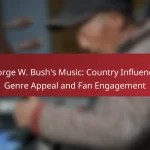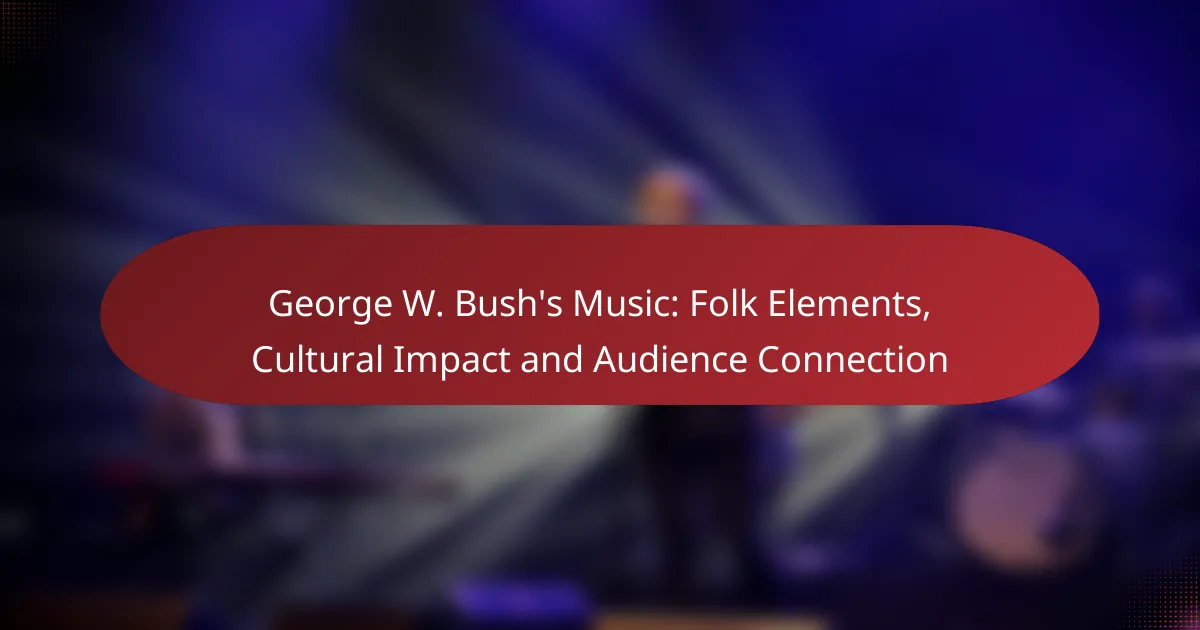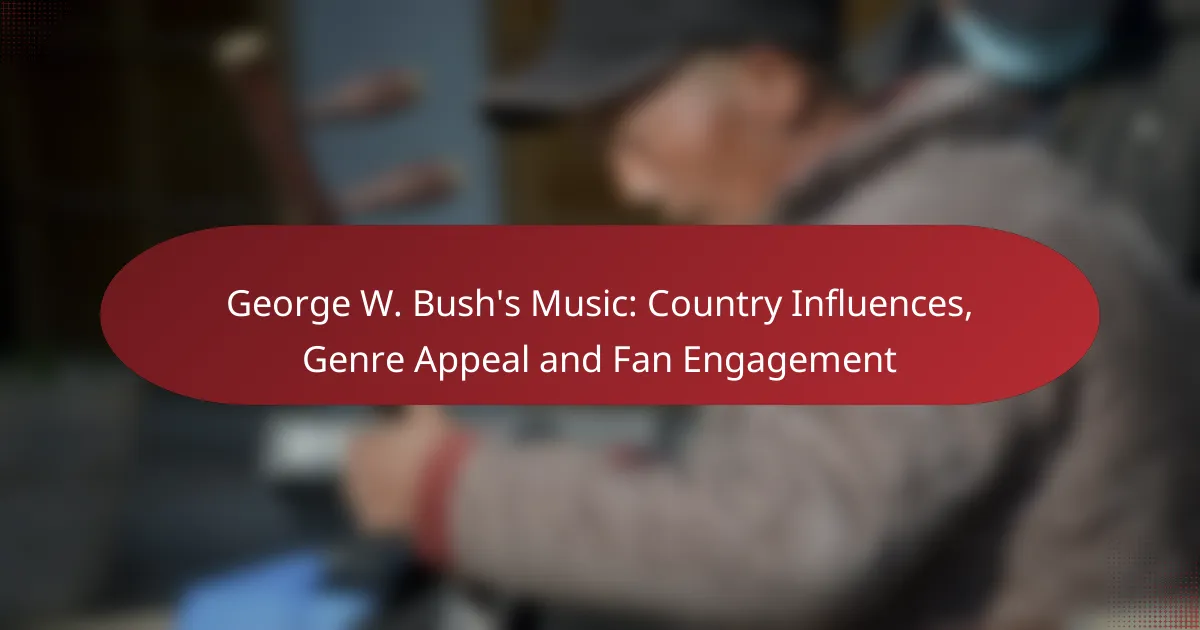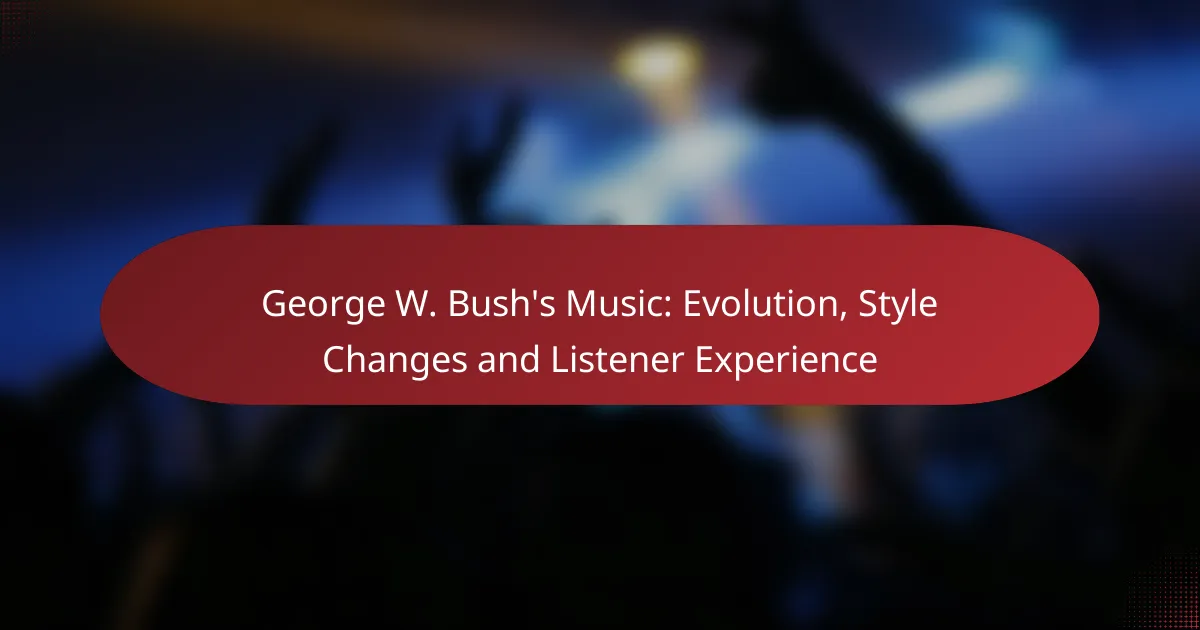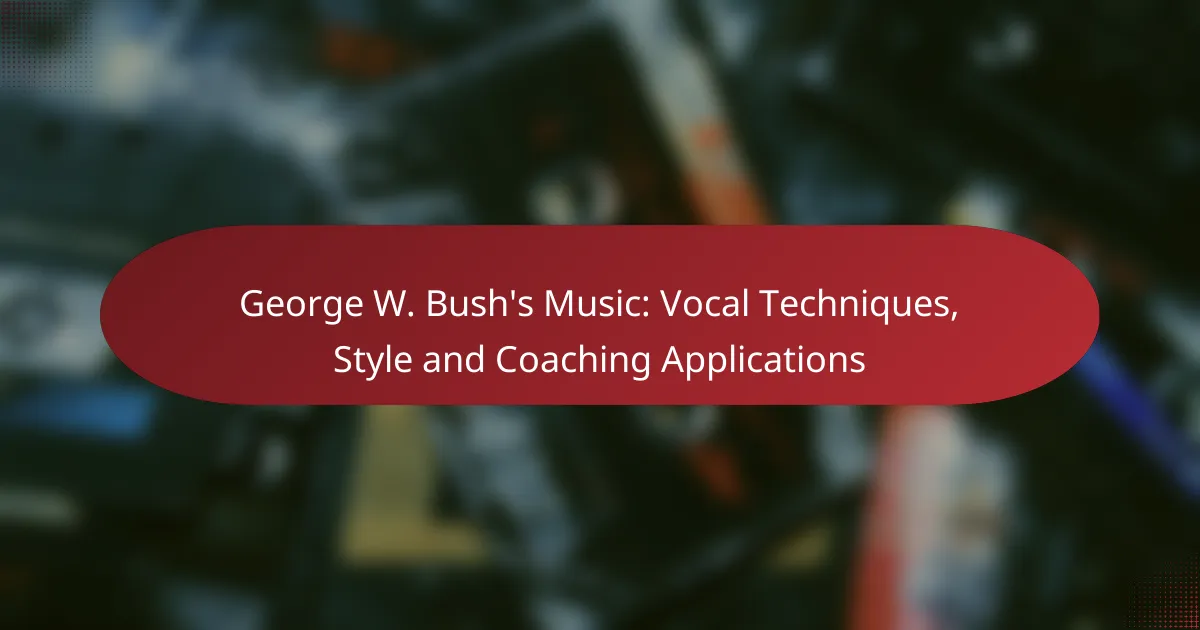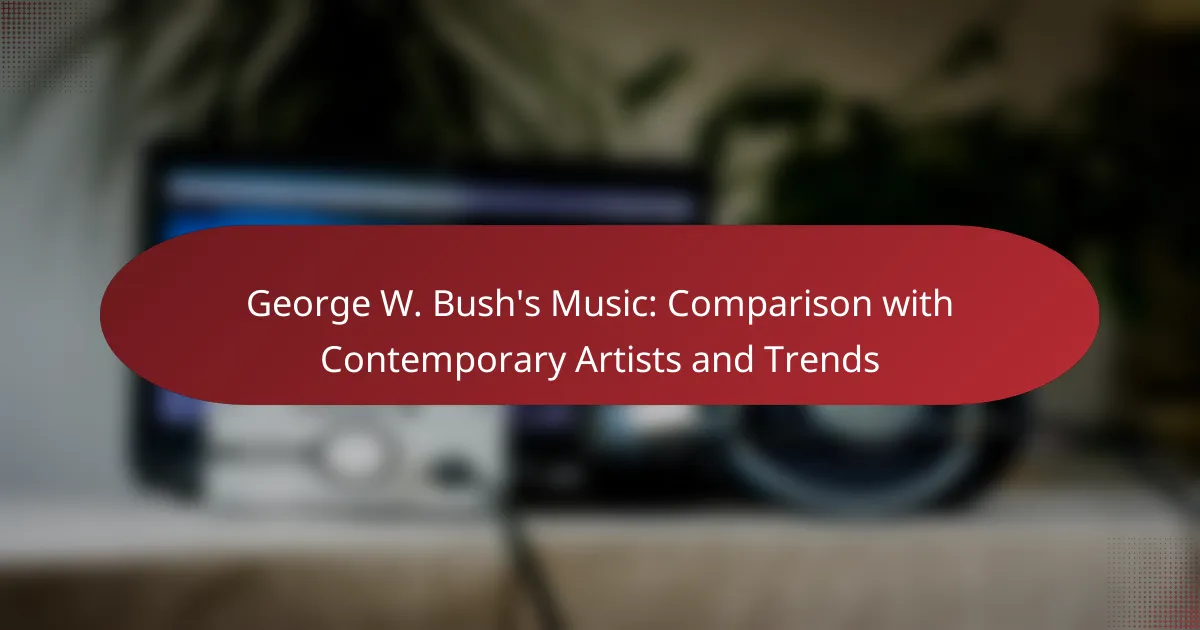George W. Bush’s music uniquely blends traditional American folk elements, characterized by storytelling and acoustic instrumentation, to evoke nostalgia and cultural heritage. This musical approach not only reflects his personal influences but also resonates with a broad audience, fostering connections through themes of patriotism and unity. By addressing relatable experiences and societal issues, his songs engage listeners on multiple emotional levels, leaving a lasting cultural impact during his presidency.
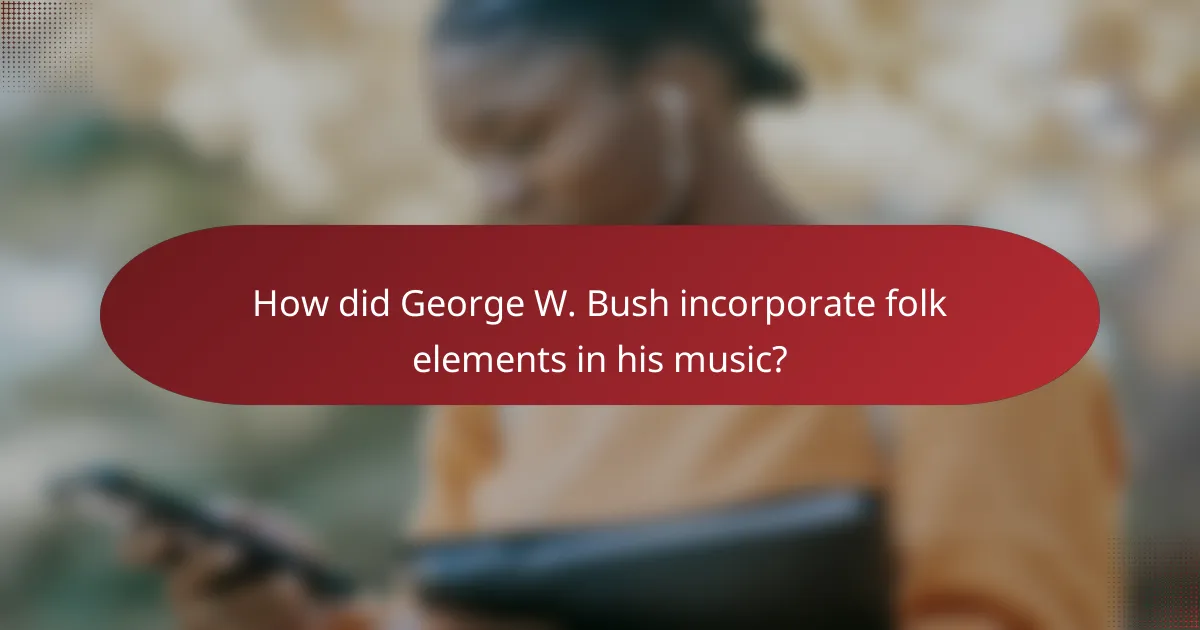
How did George W. Bush incorporate folk elements in his music?
George W. Bush incorporated folk elements in his music through a blend of traditional American sounds, storytelling, and acoustic instrumentation. This approach not only reflects his personal influences but also connects with a broad audience by evoking a sense of nostalgia and cultural heritage.
Influence of American folk traditions
American folk traditions significantly shaped George W. Bush’s musical style, drawing from the rich history of folk music that often addresses social issues and personal narratives. His songs frequently echo themes found in classic folk, such as community, resilience, and the American experience.
By integrating these traditions, Bush’s music resonates with listeners who appreciate the authenticity and simplicity of folk. This connection to heritage fosters a sense of belonging and shared values among his audience.
Use of acoustic instruments
Bush’s music prominently features acoustic instruments, which are staples of folk music. Guitars, banjos, and harmonicas create a warm, inviting sound that enhances the storytelling aspect of his songs. These instruments help to convey emotions and connect with listeners on a personal level.
Utilizing acoustic elements allows Bush to maintain a down-to-earth vibe, making his music accessible and relatable. This choice reinforces the folk tradition of using simple, organic sounds to tell complex stories.
Storytelling in lyrics
Storytelling is a central component of George W. Bush’s lyrics, reflecting the narrative style of folk music. His songs often tell personal stories or convey messages that resonate with everyday experiences, making them relatable to a wide audience.
By focusing on storytelling, Bush engages listeners emotionally, inviting them to reflect on their own lives and experiences. This narrative approach not only entertains but also fosters a deeper connection between the artist and his audience, enhancing the overall impact of his music.
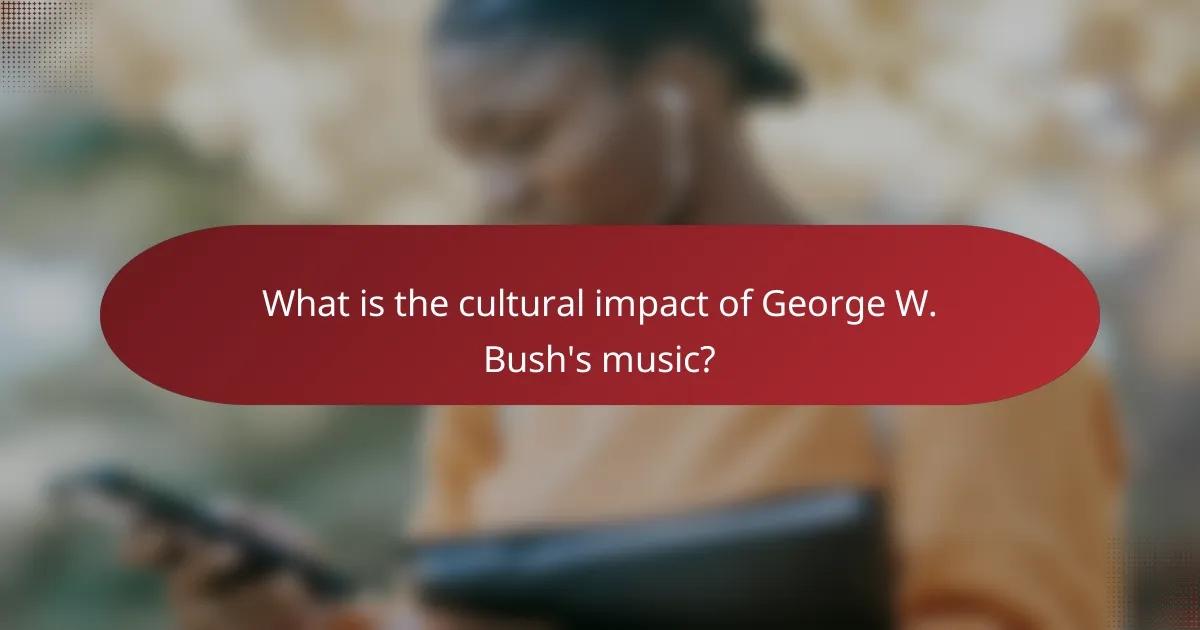
What is the cultural impact of George W. Bush’s music?
George W. Bush’s music has a notable cultural impact, reflecting American values and influencing political discourse. His songs resonate with themes of patriotism and unity, connecting with audiences on a personal level during his presidency.
Reflection of American values
Bush’s music often embodies core American values such as resilience, freedom, and community. Songs performed at significant events, like the National Anthem at presidential inaugurations, highlight a collective national spirit. This musical expression reinforces a sense of belonging among citizens.
Moreover, the themes in his music resonate with traditional American folk elements, drawing on historical narratives that celebrate the country’s heritage. This connection to folk traditions helps to solidify his music’s place in the broader cultural landscape.
Influence on political discourse
The music associated with George W. Bush has played a role in shaping political conversations, particularly during times of national crisis. Songs that evoke strong emotions can galvanize public sentiment and influence opinions on key issues. For example, music played during his speeches often aimed to unify and inspire, especially post-9/11.
Additionally, the use of music in political campaigns has become a strategic tool, with Bush’s choices reflecting his administration’s values and goals. This approach has encouraged other politicians to consider the emotional power of music in their messaging.
Connection to national identity
Bush’s music fosters a connection to national identity by celebrating American culture and history. By incorporating elements of folk music, his songs resonate with a wide audience, reinforcing a shared sense of pride and identity. This connection is particularly evident during national holidays and commemorative events.
Furthermore, the emotional weight of his music allows listeners to reflect on their own experiences and values, creating a personal bond with the broader narrative of the nation. This interplay between personal and collective identity enhances the cultural significance of his musical contributions.
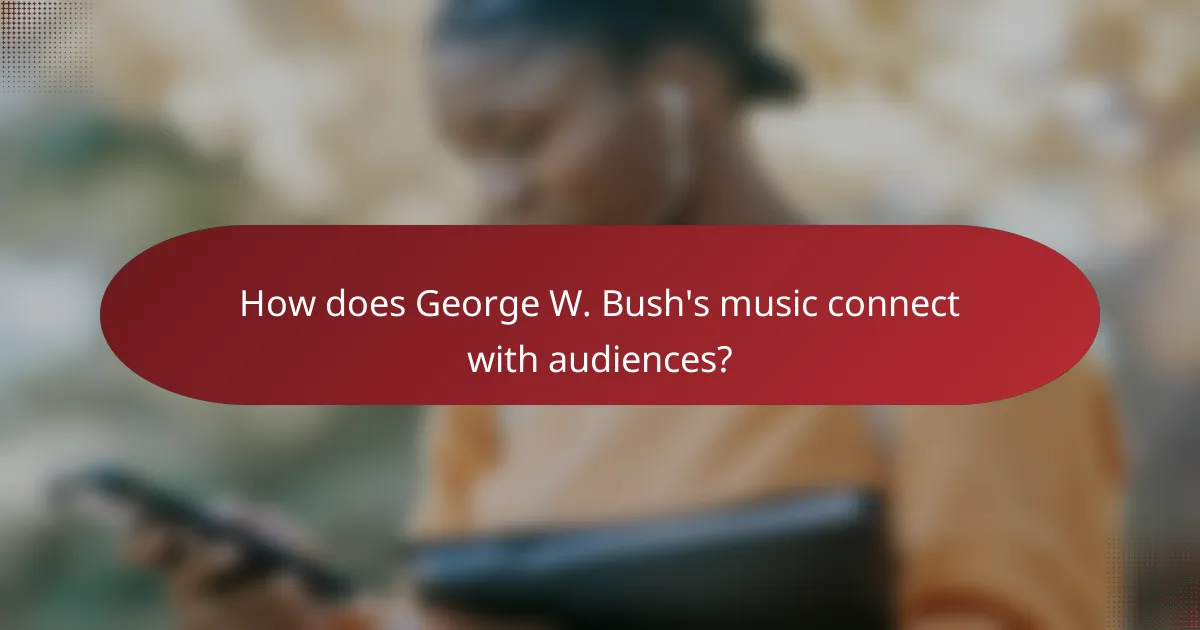
How does George W. Bush’s music connect with audiences?
George W. Bush’s music connects with audiences through its relatable themes and emotional depth, often reflecting personal experiences and broader societal issues. This connection fosters a sense of familiarity and engagement among listeners, making the music resonate on multiple levels.
Emotional resonance with listeners
The emotional resonance of Bush’s music stems from its storytelling nature, often drawing from personal narratives and shared experiences. Songs that touch on themes of love, loss, and perseverance allow listeners to see their own lives reflected in the lyrics, creating a powerful bond.
Listeners often find comfort in music that articulates their feelings, and Bush’s songs frequently evoke nostalgia and reflection, enhancing their emotional impact. This connection can lead to a deeper appreciation and loyalty from fans.
Engagement in live performances
Live performances play a crucial role in how Bush’s music connects with audiences, as they create an interactive experience that fosters community. Engaging with the crowd through storytelling and personal anecdotes during shows enhances the emotional connection and makes the audience feel like part of the experience.
Additionally, the energy of live music can amplify the emotional response, with audiences often singing along or participating in the performance. This shared experience can strengthen the bond between the artist and the audience, making the music feel more impactful.
Community-building through music
Bush’s music often serves as a catalyst for community-building, bringing people together through shared interests and experiences. Concerts and music events create spaces where fans can connect, fostering friendships and a sense of belonging among attendees.
Moreover, music can act as a unifying force, allowing diverse groups to come together around common themes and messages. This sense of community can extend beyond the music itself, encouraging social interactions and collaborations among fans.
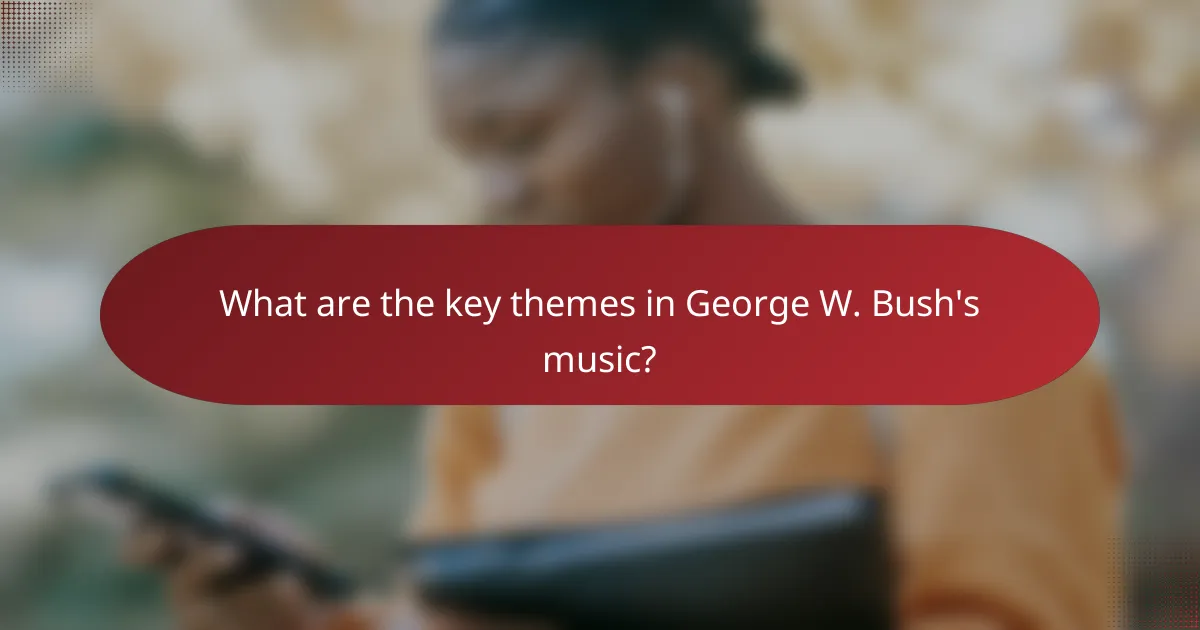
What are the key themes in George W. Bush’s music?
George W. Bush’s music often revolves around themes of patriotism, personal narratives, and social issues. These elements resonate with audiences, reflecting his experiences and the cultural context of his presidency.
Patriotism and unity
Patriotism is a central theme in George W. Bush’s music, often celebrating American values and ideals. His songs frequently evoke a sense of national pride, aiming to unite listeners during challenging times.
For example, tracks that reference historical events or symbols of America, such as the flag or national anthems, reinforce a collective identity. This approach fosters a spirit of togetherness, especially during moments of national crisis.
Personal experiences and narratives
Bush’s music draws heavily from his personal life, sharing stories that reflect his journey and values. These narratives often include themes of resilience, family, and the importance of community.
Listeners connect with these personal anecdotes, as they provide insight into Bush’s character and motivations. Songs that recount specific experiences can evoke empathy and understanding, making his music relatable to a broad audience.
Social issues addressed
Social issues play a significant role in Bush’s musical themes, addressing topics such as war, peace, and the challenges faced by American families. His lyrics often highlight the struggles of everyday citizens, aiming to bring attention to pressing societal concerns.
By tackling these issues through music, Bush encourages dialogue and reflection among listeners. Songs that discuss the impact of policies or events can serve as a catalyst for awareness and change, resonating with those affected by these circumstances.
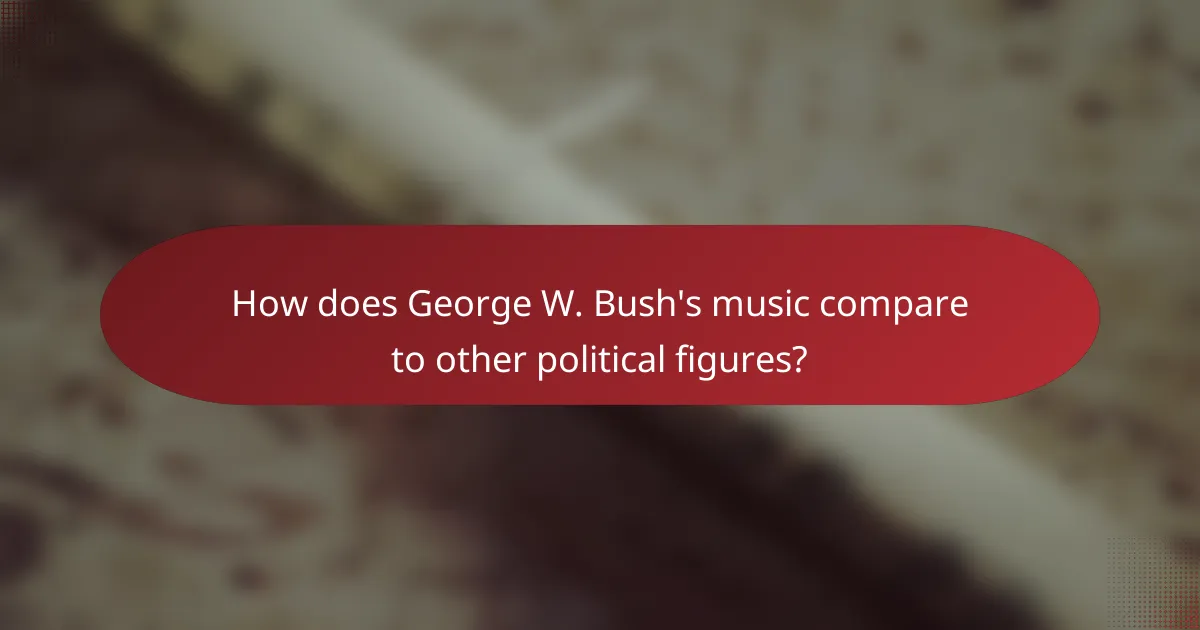
How does George W. Bush’s music compare to other political figures?
George W. Bush’s music is characterized by its folk elements and personal storytelling, setting it apart from other political figures. While many politicians use music to connect with audiences, Bush’s approach is more intimate and reflective, often drawing from his Texas roots.
Comparison with Barack Obama’s music
Barack Obama’s music selection often included contemporary genres and artists, reflecting a broader cultural engagement. In contrast, Bush’s musical style leans towards traditional folk, emphasizing acoustic sounds and storytelling. Both leaders used music to connect with their audiences, but Obama’s choices were more diverse and modern.
Obama frequently highlighted artists like Jay-Z and Beyoncé, which resonated with younger demographics, while Bush’s musical preferences included classic folk and country artists, appealing to a different audience segment.
Contrast with Bill Clinton’s musical style
Bill Clinton’s musical style was heavily influenced by jazz and blues, showcasing his deep appreciation for these genres. Unlike Bush, who favored folk music, Clinton often showcased his saxophone skills on national television, creating a more dynamic musical persona. This difference highlights how each leader’s musical choices reflect their personal backgrounds and public images.
Clinton’s music selections often aimed to bridge cultural gaps, whereas Bush’s focus on folk music reinforced his connection to traditional American values and narratives.
Musical legacy of political leaders
The musical legacy of political leaders like Bush, Obama, and Clinton shapes how they are remembered in popular culture. Bush’s folk-influenced music evokes a sense of nostalgia and simplicity, while Obama’s eclectic mix represents a modern, diverse America. Clinton’s jazz and blues legacy speaks to a rich cultural history, showcasing the power of music in political identity.
These musical legacies influence public perception and can even impact future political campaigns, as music remains a vital tool for connection and expression among leaders and their constituents.
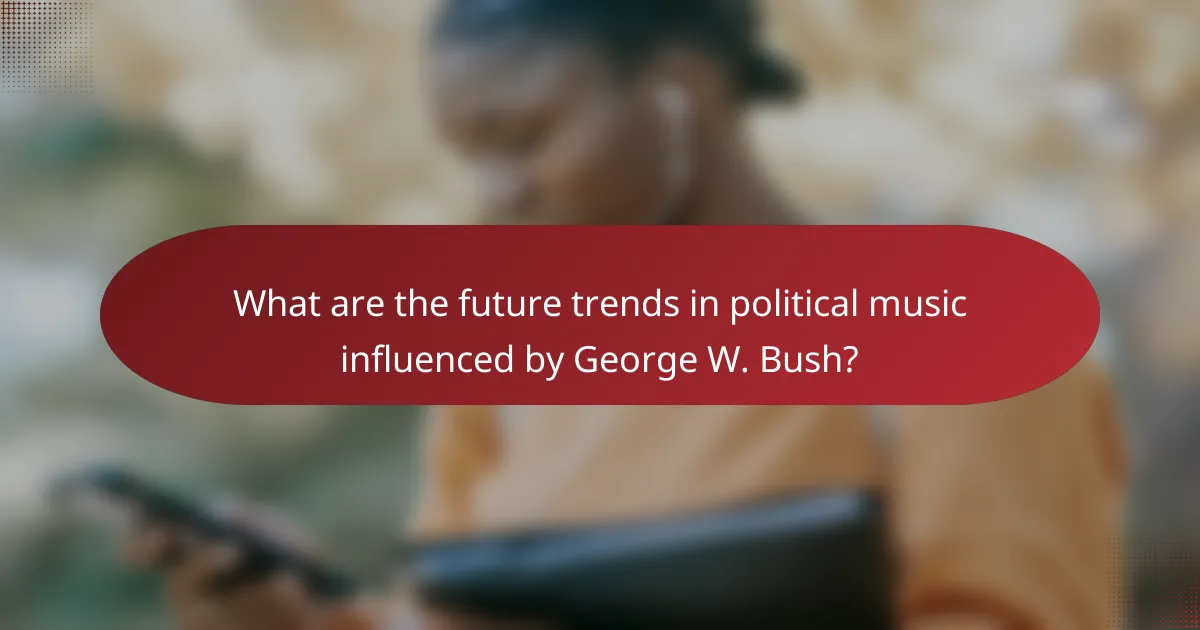
What are the future trends in political music influenced by George W. Bush?
Future trends in political music influenced by George W. Bush are likely to emphasize grassroots movements and social media engagement. Artists may increasingly blend folk elements with contemporary styles to resonate with diverse audiences and address pressing social issues.
Increased Use of Folk Elements
Folk music’s storytelling tradition is expected to gain traction in political music, as artists seek to connect with listeners on a personal level. This genre allows for the exploration of local narratives and cultural identities, making political messages more relatable. Expect to see a rise in acoustic instruments and traditional melodies paired with modern lyrics that reflect current events.
Emphasis on Social Media Platforms
As social media continues to dominate communication, political musicians will likely leverage these platforms for wider reach and engagement. Artists can share their work directly with audiences, fostering a sense of community and activism. This trend may lead to more spontaneous collaborations and live performances streamed online, making political music more accessible.
Collaboration Across Genres
Future political music may feature collaborations across various genres, merging folk with hip-hop, rock, and electronic music. This blending can attract a broader audience and amplify political messages. Artists might experiment with different styles to create innovative sounds that resonate with younger listeners who are increasingly involved in social issues.
Focus on Local Issues
Political music will likely shift towards addressing local issues that resonate with specific communities. By highlighting regional concerns, artists can create a deeper connection with their audiences. This localized approach can empower listeners to engage in activism and support initiatives that directly impact their lives.



